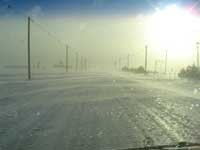Snow and Ice
ALWAYS CALL 911 if you are in immediate danger and need emergency help.
Learn ways you can do to reduce risks indoors and outdoors during severe snow or ice, or cold.
Around your home:
- ALERT: Generator exhaust is toxic. Always put generators outside well away from doors, windows, and vents. Never use a generator inside homes, garages, crawlspaces, sheds, or similar areas. Carbon monoxide (CO) is deadly, can build up quickly, and linger for hours. More information.
- EPA Urges Those Affected by Power Outages to Avoid Indoor Air Dangers, Use Generators Safely
- Never try to heat your home using a "combustion appliance" such as a gas stove, oven, barbeque grill, or dryer. Never operate any gas-burning heater or other appliance in a poorly vented or closed room, or where you are sleeping.
- Listen: Public Service Announcement about carbon monoxide
- En español: Proteja su vida y la de su familia: Evite el envenenamiento con monóxido de carbono (español) - conozca los síntomas del envenenamiento con monóxido de carbono. | Más: Tormentas de nieve y hielo
Prevent mold. If you have burst pipes and wet walls and carpet, learn how to prevent mold in your home during cleanup. Mold can cause or worsen health problems such as asthma or allergies in sensitive individuals. Listen to a mold podcast.
De-icers. You can try de-icers that are safer for people, pets, and the environment. Search SaferChoice for deicer products for use around the home.
- Burn only dry, seasoned wood and maintain a hot fire.
- Have a certified technician inspect and service your appliance annually.
- Keep your home healthy by upgrading to an efficient, EPA-approved wood-burning appliance.
- Learn more about Burnwise and what you can do.
- VIDEO: Wood Smoke and Asthma: Dry Firewood
For communities, municipalities, or airports:
Highways
- De-icers that are safer for the environment, from EPA's Safer Choice.
- Road Salt Application and Storage - Application and storage of deicing materials, most commonly salts such as sodium chloride, can lead to water quality problems for surrounding areas. Municipalities in areas with snowfall that requires deicing must ensure proper storage for materials such as road salts.
- Manual for Deicing Chemicals: Application Practices - The results of a study about minimizing the loss to the environment of chemicals used in controlling snow and ice on highways.
Airports
- Airport deicing effluent guidelines - Airports are required to obtain stormwater discharge permits and ensure that wastewater associated with the deicing of airfield pavement at commercial airports from deicing operations is properly manged.
- Storm Water Technology Fact Sheet: Airplane Deicing Fluid Recovery Systems (PDF) - This describes the recovery of spent ethylene glycol or propylene glycol through a three-stage process typically consisting of filtration, contaminant removal, and distillation.

Related info
Ready.gov:
Winter storm preparedness
National Weather Service:
weather forecast and summary
Note: the US government doesn't name winter storms, and EPA generally avoids referring to storm names created by private or commercial entities.
Read summary
